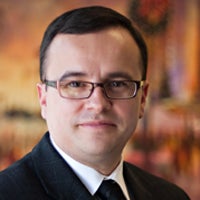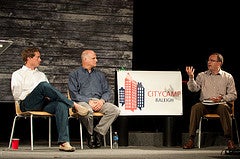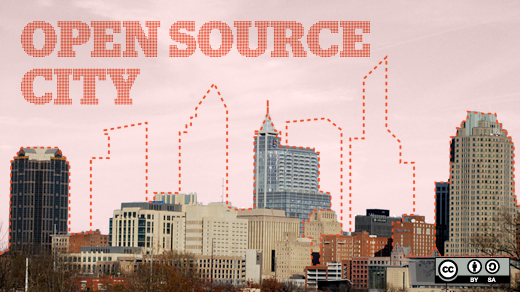In part one of our interview with David Diaz, president and CEO of the Downtown Raleigh Alliance, we explored how open source is applied to economic development, how his organization works with local government, and the programs Downtown Raleigh Alliance has implemented.
Now, David tells us how influential open source is to local leaders and how they educate government and business leaders about the power of open source. He also shares his experience with citizen participation and how he uses the open source way in his everyday life.
Do you think most local leaders view open source as important to economic development? Why or Why not?
 Yes. Most peoples' initial reaction would be that an economic developer has to keep information close to their chest. The only time you have to do that is when the client talks about it or there is a closed session with city council to close a deal. What economic developers worry about the most is a prospective client getting inaccurate information about their products (land sites, districts, etc.). It's crucial that they use an open source strategy so that the competition doesn't say bad things about them.
Yes. Most peoples' initial reaction would be that an economic developer has to keep information close to their chest. The only time you have to do that is when the client talks about it or there is a closed session with city council to close a deal. What economic developers worry about the most is a prospective client getting inaccurate information about their products (land sites, districts, etc.). It's crucial that they use an open source strategy so that the competition doesn't say bad things about them.
We are constantly talking about the products and sharing information. We are inherently supportive of the open source way--confidentiality is just a small part, but necessary in this business.
How do we educate government and business leaders about the power of the open source way?
We have got to support and create processes that are open, but lead to tangible results by virtue of the open source way. City Plaza is a great example. Aly Khalifa at Design Box is not an urban designer or an engineer, but the City opened up the design process for the creation of the City Plaza. There are people like him that designed it because he was able to participate.
We also need to link the process to the success of a public place or a facility. If you just talk about the fact the City Plaza attracts over 100,000 people per year, people won't think about the design and realize how important citizen input was to the outcome. Governments have to connect the dots with the value of an open source process to what the community sees as success. We don't do enough of that. We need to talk more about an open process as a means to creating a great city.
But there are a few things that represent a challenge. Can you have an open process for an assisted living community in your neighborhood? Governments find it hard to embrace open source across the board when they know they're going to get hammered by neighbors who are likely to take a NIMBY (not-in-my-backyard) approach. They can see the writing on the wall. The challenge for open source is solving conflicting issues such as neighbors vs developers.
Is there more citizen input in Raleigh than other places?
Absolutely. There is an inverse correlation to citizen participation and the level of technical work with a government project. This is evident in more of the complex stuff such as road projects, however, it varies across departments. Raleigh sets the example in terms of allowing citizen input—it's part of our culture already because the government here is reflective of the community.
I think citizen participation is more unique in Raleigh than in general. I've been really impressed by the amount of time that citizens in Raleigh spend understanding very technical and highly sophisticated issues. Many citizens here advocate in an informed way, rather than the reactionary, less thoughtful way that is often publicized.
In this context, I'm defining communities as a city of more that 420,000 residents. There aren't too many cities of this size that bring that much [citizen participation] to government.

David Diaz at CityCamp Raleigh
How do you apply the open source way in your everyday life?
While I'm not an elected official, my position is a public one. I'm frequently asked to comment on things related to my job. I work in an environment where I have to respond to the media and be open to the public and what's happening in downtown and to downtown. In essence, I choose to be responsive to the public and very transparent in my responses.
Another interesting way is how we apply openness to our feedback loop. We are very transparent in how we collect feedback from our stakeholders. One example is when we collect feedback from Downtown Raleigh Restaurant week.
We send two unique surveys. One is sent to the restaurant to survey their participation. Was their participation valuable? Did they get business? Would they like to participate again?
We also send a survey to the customers who came to the restaurants. We do this to make sure the restaurants included are providing a good experience to the people dining out. Our organization must be very customer-oriented. A competitive business atmosphere means a healthy downtown.
We survey both the end user and client, and then we act on it. That's how we close the feedback loop and improve the next Downtown Raleigh Restaurant week.
A big thanks to David Diaz for sharing his thoughts and experiences with us.






Comments are closed.